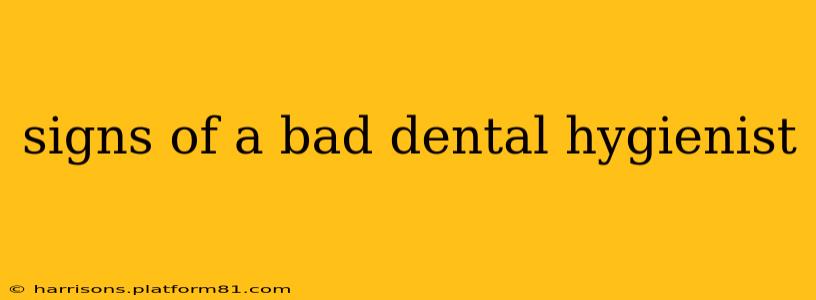Maintaining good oral hygiene is crucial for overall health, and a skilled dental hygienist plays a vital role in this process. Unfortunately, not all hygienists provide the same level of care. Recognizing the signs of a bad dental hygienist is essential to protect your oral health and ensure you receive the best possible treatment. This guide will help you identify potential red flags and make informed decisions about your dental care.
What are the signs of a bad dental hygienist?
This is a question many patients ask themselves, often after an unpleasant or concerning experience. Several indicators can point towards substandard care. These range from unprofessional behavior to a lack of proper technique, potentially leading to discomfort or even damage to your teeth and gums.
Is my dental hygienist rushing through the cleaning?
One of the most apparent signs of a bad hygienist is rushing through the cleaning process. A thorough cleaning requires time and attention to detail. If your hygienist seems hurried, skipping steps or performing the cleaning superficially, this is a major red flag. A rushed cleaning increases the risk of missed plaque and tartar buildup, ultimately harming your oral health. A competent hygienist will take the necessary time to perform a thorough and effective cleaning.
Does my hygienist lack communication skills?
Effective communication is paramount in any healthcare setting. A good dental hygienist will explain the procedure, answer your questions patiently, and listen to your concerns. Conversely, a bad hygienist may be dismissive, unresponsive, or even condescending. They may not explain what they are doing or why, leaving you feeling uninformed and uncomfortable. Open communication fosters trust and ensures you're actively involved in your care.
Is my hygienist using outdated techniques or equipment?
The field of dentistry is constantly evolving, with new techniques and equipment emerging regularly. A good hygienist stays up-to-date with the latest advancements to provide the best possible care. If your hygienist seems to be using outdated methods or equipment, it might indicate a lack of commitment to professional development and could compromise the quality of your cleaning.
Does my hygienist cause me pain or discomfort?
While some discomfort during a dental cleaning is normal, it shouldn't be excessive or unbearable. A skilled hygienist uses gentle techniques and takes precautions to minimize any discomfort. If your hygienist causes you significant pain or injury, it's a serious concern indicating a lack of skill or care. You should always communicate your discomfort immediately; a good hygienist will adjust their technique accordingly.
My hygienist seems unhygienic – is this a concern?
Maintaining a clean and sterile environment is crucial in a dental setting. Observe the hygienist's hygiene practices. If you notice anything unhygienic, such as unwashed hands, dirty equipment, or a generally unclean workspace, it's a cause for concern. Hygiene is paramount in preventing cross-contamination and protecting patients from infection.
Is my hygienist’s charting inaccurate or incomplete?
Accurate charting is essential for tracking your oral health over time. If your hygienist's charting appears inaccurate, incomplete, or inconsistent, it may indicate a lack of attention to detail and could impact the efficacy of future treatments. Accurate records help dentists and hygienists monitor progress and make informed decisions about your care.
What should I do if I suspect I have a bad dental hygienist?
If you suspect you have a bad dental hygienist, the first step is to communicate your concerns to the dentist or office manager. If the issue remains unresolved, you may want to consider seeking a second opinion from another dental practice. Remember, you have the right to choose healthcare providers who meet your expectations and provide high-quality care. Your oral health deserves the best, and switching providers is perfectly acceptable if you feel your needs aren't being met.
By paying attention to these signs and advocating for yourself, you can significantly improve your chances of receiving excellent dental hygiene care. Remember that a positive experience should be the norm, not the exception.
